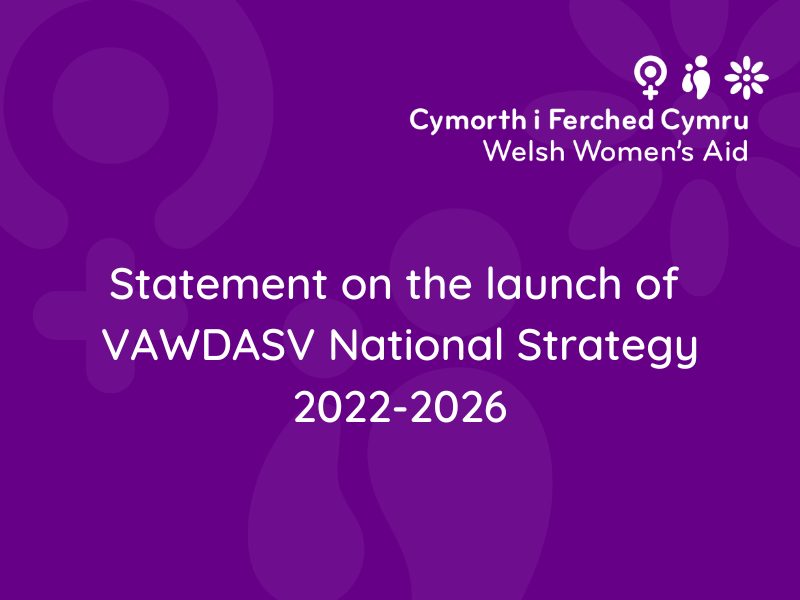
Today 24/05/22 Welsh Government published the Violence against Women, Domestic Abuse and Sexual Violence Strategy for 2022-2026.
This is a long-awaited document for survivors, the specialist VAWG sector, and all those who support and collaborate with us.
Since Welsh Government first published the VAWDASV Act in 2015 over 50 women have lost their lives to male violence here in Wales, and tens of thousands more have become survivors of violence and abuse. The majority of murdered women were killed by men who were known to them and trusted by them.
Specialist services that work to support survivors are currently doing so in a developing ‘post-pandemic’ landscape, against an escalating cost-of-living crisis, navigating short term, insecure funding cycles. Rates of violence against women, domestic abuse and sexual violence during the Covid-19 pandemic soared so high as to have been universally branded the ‘shadow pandemic’.
While funding has returned to pre-pandemic times, disclosures have not, and specialist member services and the Live Fear Free helpline alike report a consistency in an increase of survivors continuing to reach out for support. Our latest State of the Sector explores these issues further.
Welsh Government’s ambition of making Wales ‘the safest place to be a woman’ is a bold one when we consider the reality of epidemic rates of violence and abuse that far too many are experiencing- such as many migrant survivors, who are still unable to access even fundamental levels of sanctuary and safety.
We support the Government’s ambition but need to witness substance in the actions and accountability in the delivery of this strategy that match it, alongside a sustainably funded sector that that’s equipped to deliver it.
While we consult with our specialist member services and WWA Survivor’s Network for their opinions, Welsh Women’s Aid’s initial thoughts on the strategy are:
- We are pleased that the strategy acknowledges that violence against women is a whole society issue and that if we want to eliminate it, cultural change is needed with the onus of responsibility taken off women and girls modifying their actions and placed on those perpetrating toxic, misogynistic and dangerous behaviour.
- We are pleased to see a commitment to a public health approach, recognising the systemic nature of VAWDASV and the how institutions, organisations, authorities and individuals all have their role to play- and will benefit from- eliminating VAWDASV. We now await clarity and detail in the Blueprint about how true collaboration and accountability across sectors and society will work.
- Continued calls for a sustainable funding model for the sector which would ensure services have the capacity and flexibility to meet the needs of those who seek support, have not been implemented. Our last 6 State of the Sector reports, alongside countless testimony, recorded evidence, and consultation responses from those on the frontline spoke to the wide-reaching detriments of short term, insecure funding for staff and survivors alike. This strategy must be the foundation on which a sustainable funding model is fully realised.
- We are disappointed to see a lack of commitment and energy given to seeking a Welsh solution for migrant survivors who have no recourse to public funds. While this strategy emphasises the government’s ongoing ambition for Wales to be “the safest place in Europe for everyone”, this appears to stop short of providing safety for some of the most vulnerable individuals within our society. While Wales is proud of its’ status as a Nation of Sanctuary, this particular group of survivors continue to be in the margins of the conversation.
- We are concerned that intersectionality is not meaningfully embedded throughout this strategy. In order to meet the needs of services and survivors alike, there must be specific, ring-fenced funding allocated for by-and-for services. We appreciate the want outlined within the strategy to better understand the issues and barriers facing some minoritised groups (such as historically low reporting within the LGBTQ+ community) but insist that this translates into meaningful action, funding, and person-centered, trauma-informed support within the delivery.
- After two years of our No Grey Area campaign, we were pleased to see the commitment to prioritising tackling workplace sexual harassment. NGA found that 4 out of 5 women in Wales had experienced workplace sexual harassment and this was even higher for Black, Asian, and minoritised women, disabled women, and those within the LGBTQ+ community.
- We welcome Welsh Government’s commitment to centering survivor’s voices, ensuring that the lived experience of abuse and the understanding of what works to support, empower and thrive is at the heart of this strategic approach and delivery. This is especially important when we consider the time that survivors dedicated to informing today’s strategy, and those that have been published before it. The specialist sector as it exists today was founded on survivor activism and continues to be a space where those with lived experience work, contribute to, and support others every day in their journeys. To ensure that these voices are not siloed, or expertise undervalued, is vital.
For more information please contact Sophie Weeks, Head of Public Affairs and Communications, on [email protected]
For press, please contact [email protected]
For other inquiries, please contact [email protected]

